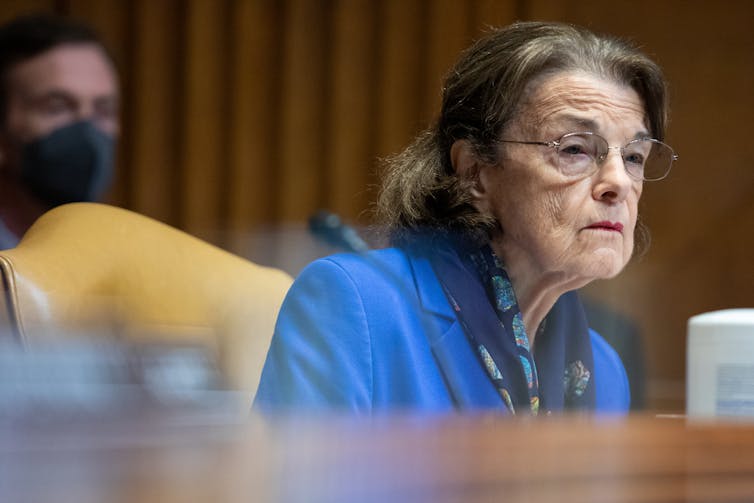
Pennsylvania Democratic Sen. John Fetterman’s hospitalization for depression has raised anew the question of how much health information a candidate or politician should reveal to the public.
Most people expect that their health is a private matter. And for a politician or office seeker, such disclosures can be used as political weapons by their opponents. But when someone voluntarily enters the sphere of public service and elective office, do they have an obligation to inform their constituents about how well they can actually execute the job they’re asking to be elected to?
Fetterman had a near-fatal stroke in May 2022. One reporter interviewed him during the 2022 Senate campaign and gave a firsthand account of how Fetterman seemed to have trouble coping with his post-stroke problems. She was attacked by other reporters for suggesting that he was struggling to have a basic conversation. Throughout the 2022 U.S. Senate campaign, Fetterman’s staff gave conflicting and confusing accounts of his health.
In any other job interview in the U.S., it would indeed be forbidden – from a social and legal perspective – to ask about the applicant’s health. And it does not serve the public interest to pry too much into politicians’ lives.
But candidates who won’t disclose their medical records can put the voters at a disadvantage. Before citizens cast their ballots they should know pertinent information about health problems. Just as voters should know a candidate’s positions on issues, voters should know about politicians’ ability to advocate for those positions and to fully represent their constituents.
As The Philadelphia Inquirer editorial board wrote in October 2022, “It’s fair to question John Fetterman’s fitness after his stroke. Communication is part of being a senator. It’s perfectly reasonable for Pennsylvanians to ask about how well he is able to listen, speak, focus, and understand.”
There are consequences when politicians – and the media that cover them – aren’t transparent.
Precedent for secrecy
History is full of examples of the media covering up politicians’ medical problems. That, in turn, exacerbates a common perception that reporters are complicit with politicians in concealing important information from the public.
Traditionally, reporters hate cover-ups but seem to make an exception for health concerns. The media apparently consider it within the bounds of campaign job interviews to ask a politician whom he is having sex with, what type of underwear he wears, how many ex-girlfriends’ abortions he paid for and precisely how gay he is.
But reporters practically become snooty, high-brow puritans at the thought of asking a politician whether their health will allow them to show up to work.

Reporters in cahoots
Campaigns and sitting politicians notoriously dodge health questions, as I have documented in my research. Journalists long acted as co-conspirators in allowing politicians to deceive the public about their health.
For example, it had long been an open secret among Capitol Hill reporters that Sen. Dianne Feinstein, now 89 years old, has lost much of her mental sharpness and her memory. Sen. Strom Thurmond did not retire until he was 100 years old, and reporters largely kept his cognitive ailments hidden. Thurmond regularly asked people to repeat themselves, and often spoke in unintelligible sequences of words.
Experiments I have conducted that test the effects of a politician deceptively dodging questions indicate that evasion may backfire, causing voters to focus even more on what a candidate is hiding. Coming clean about health problems may actually bolster the public’s confidence more than claiming to have a clean bill of health and then being unable to do the job.
An extreme example of this problem is provided by serial liar Rep. George Santos. Unlike most politicians who lie about their health to sound as if they are impervious to maladies, the New York lawmaker took the opposite approach while campaigning for Congress. Santos listed all sorts of health problems he suffers from: acute chronic bronchitis, a brain tumor, an immunodeficiency, and susceptibility to cancer.
Most of Santos’ claims about his life other than his health have been fact-checked. After he was elected, the media thoroughly investigated and dispelled his claims ranging from saying he was Jewish to saying he had played college volleyball. But Santos’ statements about his own mental or physical abilities seem to have gone unquestioned. Santos was either lying or telling the truth about being unwell.
Either way, the public should have known.

Fit for office
When Fetterman had a stroke in the middle of the hotly contested Pennsylvania race for U.S. Senate, the media seemed to minimize it in their coverage. Vox called it an “asset” because he would bring more attention to disabilities in Congress, and Slate said the health struggle was beneficial in helping him raise campaign money. That soft-pedaling echoed the Fetterman campaign’s own tendency to hide details or release partial truths.
Strokes are common, though, and the public should be educated about them, not given the impression that a stroke is a rare and unmentionable event. Two other sitting U.S. senators had strokes in 2022. It would save lives if the public talked more, not less, about common health conditions such as strokes.
It’s also possible that by concealing a health condition from the public, the public – if and when it finds out – will get the message that the condition was hidden because it is a disabling one, when that may not actually be the case.
Fetterman’s current hospitalization at Walter Reed National Military Medical Center is for depression, which his chief of staff said Fetterman has experienced “off and on throughout his life.” The announcement of his hospitalization sparked an outpouring of support from colleagues and others. A fellow Democrat, Rep. Susan Wild of Pennsylvania, called him “a courageous leader in sharing the circumstances of his hospitalization with the public.”
But because Fetterman did not reveal his full medical record during the campaign, voters were unaware of the condition that has now landed him in the hospital. Given the support shown after he checked into Walter Reed, it’s possible that revealing his depression would not have caused him a loss of voter support on Election Day.
Struggling with mental and physical ailments is part of the human condition. Someone who has depression can still be an effective legislator, but someone who needs to be hospitalized may be restricted from conducting essential functions of their work such as participating in committee hearings and voting on legislation.
It may be time to consider a political candidate’s health – their literal, physical fitness for the office – to be fair game for campaign disclosure. Asking politicians whether they have the ability to serve in office should not be off-limits, nor considered evidence of “ableism.”
If civil discussions of mental and physical health impairments can be held – rather than treated like stigmas that must be hidden – democracy would be healthier. Voters would have the facts they need to make well-informed decisions about who can best represent them, not just by sharing their views and values, but by actually performing the work associated with holding public office and serving their constituents.
David E. Clementson does not work for, consult, own shares in or receive funding from any company or organization that would benefit from this article, and has disclosed no relevant affiliations beyond their academic appointment.
This article was originally published on The Conversation. Read the original article.







